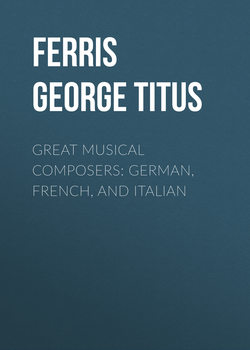Читать книгу Great Musical Composers: German, French, and Italian - Ferris George Titus - Страница 19
HAYDN
V
ОглавлениеIn his charming little cottage near Vienna Haydn was the centre of a brilliant society. Princes and nobles were proud to do honour to him; and painters, poets, scholars, and musicians made a delightful coterie, which was not even disturbed by the political convulsions of the time. The baleful star of Napoleon shot its disturbing influences throughout Europe, and the roar of his cannon shook the established order of things with the echoes of what was to come. Haydn was passionately attached to his country and his emperor, and regarded anxiously the rumblings and quakings of the period; but he did not intermit his labour, or allow his consecration to his divine art to be in the least shaken. Like Archimedes of old, he toiled serenely at his appointed work, while the political order of things was crumbling before the genius and energy of the Corsican adventurer.
In 1798 he completed his great oratorio of “The Creation,” on which he had spent three years of toil, and which embodied his brightest genius. Haydn was usually a very rapid composer, but he seems to have laboured at the “Creation” with a sort of reverential humility, which never permitted him to think his work worthy or complete. It soon went the round of Germany, and passed to England and France, everywhere awakening enthusiasm by its great symmetry and beauty. Without the sublimity of Handel’s “Messiah,” it is marked by a richness of melody, a serene elevation, a matchless variety in treatment, which make it the most characteristic of Haydn’s works. Napoleon, the first consul, was hastening to the opera-house to hear this, 24th January 1801, when he was stopped by an attempt at assassination.
Two years after “The Creation” appeared “The Seasons,” founded on Thomson’s poem, also a great work, and one of his last; for the grand old man was beginning to think of rest, and he only composed two or three quartets after this. He was now seventy years old, and went but little from his own home. His chief pleasure was to sit in his shady garden, and see his friends, who loved to solace the musical patriarch with cheerful talk and music. Haydn often fell into deep melancholy, and he tells us that God revived him; for no more sweet, devout nature ever lived. His art was ever a religion. A touching incident of his old age occurred at a grand performance of “The Creation” in 1808. Haydn was present, but he was so old and feeble that he had to be wheeled in a chair into the theatre, where a princess of the house of Esterhazy took her seat by his side. This was the last time that Haydn appeared in public, and a very impressive sight it must have been to see the aged father of music listening to “The Creation” of his younger days, but too old to take any active share in the performance. The presence of the old man roused intense enthusiasm among the audience, which could no longer be suppressed as the chorus and orchestra burst in full power upon the superb passage, “And there was light.”
Amid the tumult of the enraptured audience the old composer was seen striving to raise himself. Once on his feet, he mustered up all his strength, and, in reply to the applause of the audience, he cried out as loud as he was able – “No, no! not from me, but,” pointing to heaven, “from thence – from heaven above – comes all!” saying which, he fell back in his chair, faint and exhausted, and had to be carried out of the room.
One year after this Vienna was bombarded by the French, and a shot fell in Haydn’s garden. He requested to be led to his piano, and played the “Hymn to the Emperor” three times over with passionate eloquence and pathos. This was his last performance. He died five days afterwards, aged seventy-seven, and lies buried in the cemetery of Gumpfenzdorf, in his own beloved Vienna.
